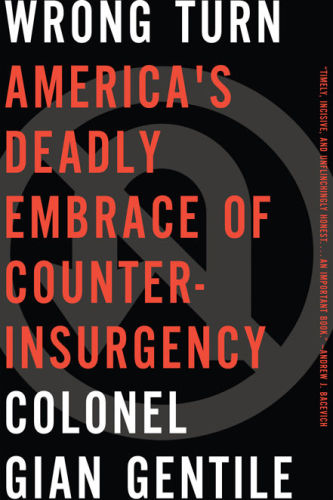
Wrong Turn
America's Deadly Embrace of Counter-Insurgency
کتاب های مرتبط
- اطلاعات
- نقد و بررسی
- دیدگاه کاربران
نقد و بررسی

May 13, 2013
In 2006, after five years as a warzone, Iraq was descending into chaos. But then General David Petraeus arrived, adopted counterinsurgency (COIN) tactics, and ended the war. That’s the official story, but according to Gentile (a former Iraq War commander and current director of West Point’s military history program), it didn’t really happen that way. In this vivid and astute polemic, Gentile argues that the U.S. military’s appropriation of COIN, a strategy with a long and fraught history, as the author explains, was a dangerously misguided attempt “to refight the Vietnam War—but this time in Iraq.” COIN, in Gentile’s estimation, is little more than “a recipe for perpetual war.” In fact, he argues that the conflict in Iraq was settled not by Petraeus’s use of COIN; rather, the violence subsided when Sunni insurgents turned against al-Qaeda, and Shia factions quit fighting one another. Yet that hasn’t stopped the powers that be from implementing COIN in the Afghan theater. Gentile ultimately offers a sobering warning—if we refuse to learn from the failures of COIN and end our foolish belief in savior generals, we are “doomed to repeat the same mistakes for a long, long time.” This should be required reading for military scholars and active soldiers.

June 1, 2013
"The story on which the current practice of [counterinsurgency] depends...is a myth [and] a recipe for perpetual war," insists Gentile (Securing the Snake's Head: The Question of Air Power as a Political Instrument in the Post Cold-War Security Environment, 2012, etc.), a former Iraq War commander and director of the military history program at West Point. The author takes a spirited, polemical approach in support of his argument against "the simplistic idea that the U.S. can intervene to rebuild entire societies if the tactics are just right and the right general is put in charge." What he calls "the story" is a view of the history of wars in Malaya, Vietnam, Iraq and Afghanistan, which he considers to be tendentious at best and downright wrong at worst. Though many believe that gifted generals, like David Petraeus in Iraq, learned the lessons from Vietnam and corrected the mistakes of their fumbling predecessors, Gentile disagrees. Sifting through the countless reports that were filed, he shows just where this mythical narrative is flawed. In each case, there was no transforming succession of methods of warfare, and there was no redefining shift in leaders. Nor, he insists, are the wars referred to in the official narrative comparable, whether in scale, context or scope. The strategy adopted to force a negotiated settlement in Vietnam was not applicable in Iraq, and the Iraqi surge was less of a discontinuity than it is usually portrayed to have been. For Gentile, it is the political circumstances that are the most important elements, as well as political leadership looking for what Petraeus' predecessor Gen. George Casey called "something that appeared different." A forcefully presented, corrective analytical approach to today's headline-grabbing orthodoxy.
COPYRIGHT(2013) Kirkus Reviews, ALL RIGHTS RESERVED.

























دیدگاه کاربران